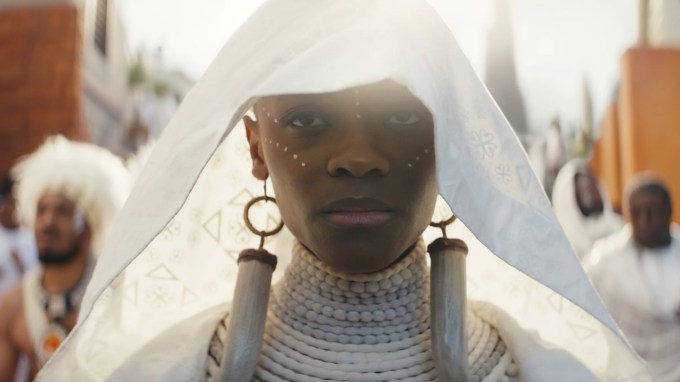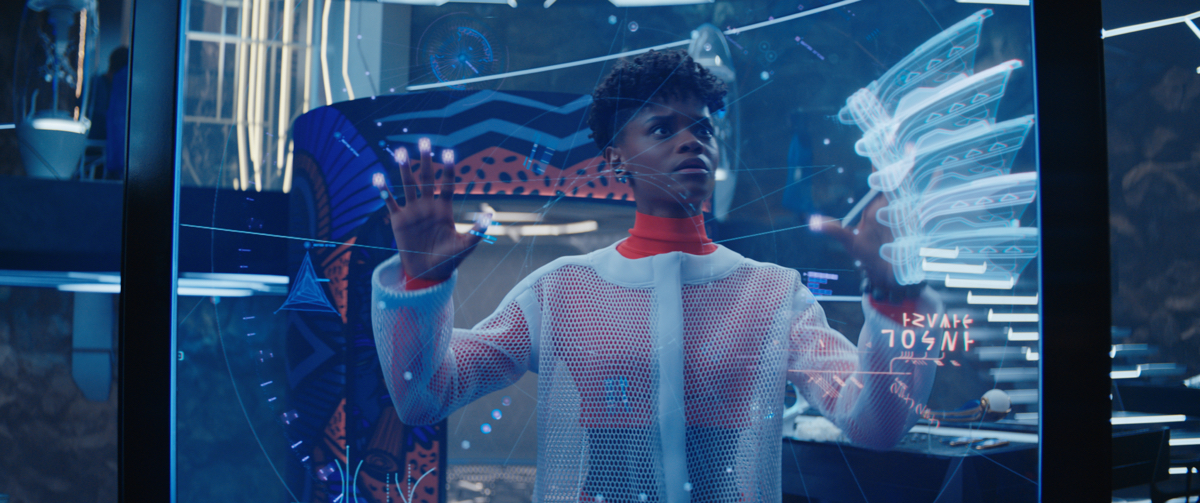Visual effects artists, especially the ones that work on Marvel films, are in more demand than ever — and rarely get enough credit. Nearly a dozen VFX houses contribute to one Marvel project. Perception, the Emmy-nominated design and VFX lab that has worked on 33 Marvel films and series, was assigned the challenging task of designing most of the technology seen in “Black Panther: Wakanda Forever.”
We spoke with the team at Perception about their contributions to the movie, which includes holograms, sentient AI, HUDs (head-up displays), and interfaces, along with the captivating main-end-on title sequence and the emotional tribute to the late actor Chadwick Boseman (who plays Black Panther) at the beginning of the movie. Perception worked on approximately 90 shots in total, the company told us.
(Heads up that this TechCrunch story contains movie spoilers.)
According to VFX supervisor Geoffrey Baumann, around 2,233 shots in “Black Panther: Wakanda Forever” required VFX, reported The Hollywood Reporter.
Conceptualizing the visionary technology seen in the film was probably no easy feat. The African nation of Wakanda has by far the most advanced tech in the entire Marvel Cinematic Universe (MCU). For instance, the fictional country has “vibranium” as its main resource, a metallic ore that has energy-manipulating properties, absorbs sound and can be utilized for bullet-proof gear.
Luckily, Perception has been in the industry for 20 years and played an important part in the first “Black Panther” film, designing, developing, animating and rendering Wakandan technology, such as Kimoyo beads, a cutting-edge communication device.
“Since the production of the first ‘Black Panther’ film, our team has been deeply involved with the world of Wakanda,” said Eric Daly, director of Production at Perception. “Marvel Studios asked us to return for this film to design the characters’ technology and create the main-on-end title sequence due to our deep-rooted connections with Wakanda.”
When creating the main-on-end title sequence for “Black Panther: Wakanda Forever,” Perception wanted it to be “tied into the intense emotions and somber yet joyful tone at the end of the film,” Daly added.
The title sequence plays before the end-credit scene. It begins with a beautiful shot of Shuri’s funeral ceremonial robe igniting into flames. The cloth burns slowly and eventually reveals the Black Panther suit.
Throughout the film, the Princess of Wakanda, Shuri (played by Letitia Wright), is grieving the loss of her brother, T’Challa, a.k.a Black Panther. Her mother, Queen Ramonda (Angela Bassett), suggests that Shuri burn her funeral clothing in a ritual. Shuri tells her, “It won’t be just the clothes I burn. It will be the world.” The anger that Shuri has at that moment, contrasted with when she’s in the acceptance stage of grief at the end, is captured perfectly in Perception’s sequence.
“The title sequence for this movie is so emotionally resonant. It allows Shuri to have this moment where she can sit in her grief and mourn her brother, but it’s also for the audience to grieve the loss of Chadwick Boseman. It’s for the creators to grieve the loss of their friend. There were a lot of layers to the sequence that made it very emotionally powerful,” Doug Appleton, chief creative director at Perception, said to TechCrunch.
Boseman, the actor who played Black Panther, died of Stage 4 colon cancer in 2020. Instead of recasting Boseman, who had been such an inspiration for fans — particularly those in the Black community — Marvel decided to incorporate the devastating death of the Black Panther star into “Black Panther: Wakanda Forever.”
In addition to the powerful main-on-end title sequence, Perception also created the opening animation of the Marvel logo, which includes clips of Boseman’s character. The animation was also featured in the first “Black Panther” movie, which can be streamed on Disney+.
Christian Haberkern, art director and cinematographer at Perception, filmed the main-on-end title sequence with a Panavised Sony Venice 2 camera with Panavision Auto Panatar Super Speed Anamorphic Lens, which was provided by Autumn Durald Arkapaw, director of photography (DP) on “Black Panther: Wakanda Forever” and “Loki.”
(Panavision is a proprietary name for a type of wide-screen camera lens. Anamorphic Panavision lenses allow filmmakers to capture a wider field of view.)
“It is rare that we get to work so closely with the DP and use the actual camera and the lenses that they used. So that’s something very unique that we don’t always have the opportunity to do,” Appleton said.
Sony’s Venice 2 camera can cost up to roughly $55,000 and is among the top choices of digital cameras for acclaimed DPs because of its high degree of image quality.
The camera Haberkern used, in particular, was custom-built for films that work with fire. Haberkern noted just how “insane” it felt to film with such highly advanced equipment. “The lens is specialized to make the light and fire have this unique bokeh,” he said.
“Fire is unruly and unpredictable, so we had to invent ways to try to control the flames while we filmed,” said Greg Herman, creative director at Perception. “One of our methods was using butane fuel to coat the fabric and direct the flame to ignite a certain way. With this, we were able to create a simulation of a flame so we could capture precise and detailed shots.”
Appleton chimed in, saying, “While shooting the sequence, we made sure to get as much footage as possible because we didn’t know exactly what pieces would go where, and when working with something as unpredictable as billowing fabric and fire we wanted to embrace the unexpected moments that we could never have planned for.”
Several applications and software were used for the editing process. For the majority of the shots, the team used Premiere and then After Effects for final color. Meanwhile, the shot with the Black Panther suit was CG, which was accomplished in Cinema 4D, composited in Nuke, and then transferred into After Effects, Appleton explained.
[gallery ids="2458308,2458310,2458311"]
In terms of other scenes in the film, Perception had a part in shaping the entire story from start to finish, collaborating with the director Ryan Coogler, executive producer Nate Moore, as well as the filmmakers, writers and VFX team for a total of two years. Perception claims to have developed “every facet of each piece of technology you see on screen.”
In the opening scene, we see Shuri in the lab trying to recreate the heart-shaped herb to save her brother, T’Challa, who is dying. Shuri interacts with a helix structure, touching LED balls that glow red and green as she gives Griot, the sentient AI, various commands. The physical form of the helix was done by another VFX studio, Rise; however, Perception helped form that idea, plus all the other tech like Griot, the head-up displays and other graphics.
Perception also helped design Riri’s HUD for when she’s fighting in her superhero suit. Riri (played by Dominique Thorne) is an MIT student and brilliant innovator known as “Ironheart” in the comics. The co-founders of Perception, Jeremy Lasky and Danny Gonzalez, pointed out to us that “Iron Man 2” was the first big feature they worked on with Marvel. So, this likely inspired Riri’s Ironheart suit.
Another cool idea that Perception conceptualized was the hydro bombs that the Talokans used as weapons throughout the movie. Marvel wanted it to look like “a lake compressed into a ball,” Appleton explained to TechCrunch. “So we did a little bit of work on that.”
Perception was founded by Lasky and Gonzalez in 2001. The New Jersey-based VFX studio has worked on technology and title sequences for many Marvel titles, such as “The Avengers,” “Thor: The Dark World,” “Captain America: The Winter Soldier,” “Doctor Strange,” “Spider-Man: Homecoming,” “Black Widow,” “WandaVision,” “Loki,” “Moon Knight” and lots more. Perception is also confirmed to be working on the upcoming films “Ant-Man and The Wasp: Quantumania” and “Guardians of the Galaxy Vol. 3.”
“Black Panther: Wakanda Forever” premiered in theaters on November 11. If you didn’t get the chance to see it yet, the movie will most likely stream on Disney+ sometime in January, but no premiere date has been officially announced. The movie grossed over $770 million at the box office worldwide. It also scored two Golden Globes nominations.
VFX studio Perception takes us inside the tech of ‘Black Panther: Wakanda Forever’ by Lauren Forristal originally published on TechCrunch

















 English (US) ·
English (US) ·